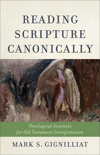
Overview
Veteran Old Testament teacher Mark Gignilliat explores the theological and hermeneutical instincts that are necessary for reading, understanding, and communicating Scripture faithfully. He takes seriously the gains of historical criticism while insisting that the Bible must be interpreted as Christian Scripture, offering students a "third way" that assigns proper proportion to both historical and theological concerns. Reading and engaging Scripture requires not only historical tools, Gignilliat says, but also recognition of the living God's promised presence through the Bible.
Table of Contents
Contents
Introduction
Part 1: Scripture's Material Form
1. Scripture and Canon
2. Sanding with the Grain: Final Form and Canonical Shape
3. Canonical Intentionality
4. Canon and Textual Criticism: The Search for the Christian Bible
Part 2: Scripture's Subject Matter
5. God as Triune, and Exegetical Metaphysics
6. The Trinity and the Old Testament
Epilogue
Indexes
Introduction
Part 1: Scripture's Material Form
1. Scripture and Canon
2. Sanding with the Grain: Final Form and Canonical Shape
3. Canonical Intentionality
4. Canon and Textual Criticism: The Search for the Christian Bible
Part 2: Scripture's Subject Matter
5. God as Triune, and Exegetical Metaphysics
6. The Trinity and the Old Testament
Epilogue
Indexes
Endorsements
"How might we read the Old Testament canon as Christian Scripture? This is the driving question of the volume. Gignilliat places critical discussions within the framework of the Old Testament as an intentionally crafted, living Word of God and then proposes how Christians might read it with trinitarian sensibilities. This fresh and thoughtful exploration of what it means to read the Old Testament canon theologically can enrich current debates."
M. Daniel Carroll R. (Rodas), Blanchard Professor of Old Testament, Wheaton College and Graduate School
"Here is an authentic Christian refrain about the Bible, echoing the tradition but transposed into a twenty-first-century key. Gignilliat does ample justice to Scripture's material form and historical situatedness--this is not a screed against historical criticism--yet he pushes beyond source-oriented considerations and reconstructions to grapple with the trinitarian witness of the biblical canon, especially the Old Testament. These are questions that contemporary Christian biblical scholars usually neglect to pursue. May it be otherwise!"
Stephen B. Chapman, associate professor of Old Testament, Duke University
"Drawing beautifully on Childs and Sheppard, Gignilliat concludes that for the canon, fixity is a pole rather than a stage. Along the way, the author discusses what links Gunkel to von Rad and what was at stake between Lagarde and Kahle. Hence this work does dual service as a textbook and as a serious spur to scholarly thinking. Gignilliat is unafraid to step beyond 'biblical studies' into a theology that is constructive for lives and churches. The Word finds a body in the text as witness to Him as having touched the lives of people, a far cry from Edwin Muir's caricature of a 'religion of the book.'"
Mark W. Elliott, professor of theology, University of Glasgow
"Gignilliat seeks to persuade us to read Scripture in a manner that unites every passage, as each relates to the comprehensive purpose and plan of God revealed in Scripture by the Holy Spirit, in order to magnify Jesus Christ. This work can help us to go beyond simply reading the Word to having an encounter with the God of the Word by reading the Bible with an intra-trinitarian lens, enabling us to marry doctrine with doxology."
Robert Smith Jr., Charles T. Carter Baptist Chair of Divinity, Beeson Divinity School, Samford University
"With nuance and confessional humility, Gignilliat gives readers a book that manifests the rare combination that he himself possesses--equal comfort both in the field of Old Testament scholarship and in the theological and philosophical world. He offers not the mechanics of a method but something far more valuable: orthodox reflections that train our instincts and expectations as we go about reading the Old Testament as Christian Scripture."
Jonathan T. Pennington, associate professor of New Testament interpretation, Southern Baptist Theological Seminary
"This book is a fascinating invitation and useful guide for all students who are interested in the very essence of both parts of the Christian Bible. Canon is understood as the very subject matter of the Bible: the Triune God as one and the same in the Old and New Testaments. The author arouses the reader's curiosity about how it may work, and he shows how to combine serious exegetical work on the variety of biblical texts with the enduring quest for the Triune God. Gignilliat reminds us all not to lose sight of God as the canonical center of the Christian Bible."
Hermann Spieckermann, professor of Old Testament, University of Göttingen
Author
Mark S. Gignilliat
Mark S. Gignilliat (PhD, University of St. Andrews) is professor of divinity at Beeson Divinity School, Samford University, and theologian in residence at St. Peter's Anglican Church in Birmingham, Alabama. He previously taught at Wycliffe Hall, University of Oxford. Gignilliat is the author of several books, including Reading Scripture Canonically, A Brief History of Old Testament Criticism, and Karl Barth and the Fifth Gospel.